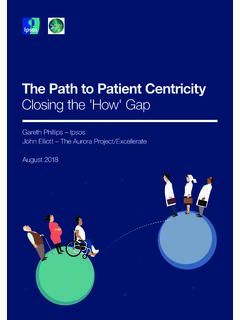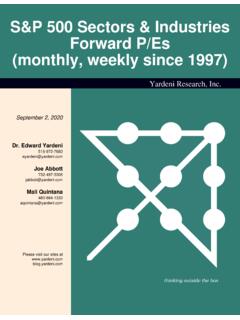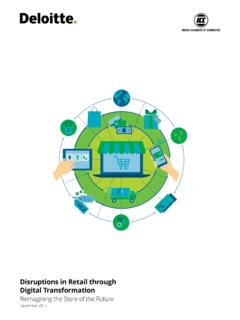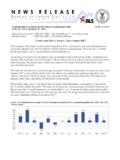Transcription of Sustainability Issues In The Retail Sector
1 Reputation Centre Sustainability Issues In The Retail Sector I don't think there's a one size fits all policy on this . Retailers need to find their own ways . What will follow from that is a way of developing a dialogue with their customers NGO/Interest Group 2 Ipsos MORI: Sustainability Issues in the Retail Sector Contents Introduction 3. Executive Summary 6. Recommendations for retailers 8. consumer Expectations on Sustainability and Leading the Way 12. Are consumers going green'? 12. The price of Sustainability 16. The problem of choice 18. It's all about trust 19. The cynical consumer 20. Cynicism and Retail 21. Taking the lead 22. Precipitating change 23. In summary 25. The Communications Challenge 28. Consumers want more information 28. Cutting through 30. Education, education, education 31. Media is most trusted information source 32. The need for an independent measuring stick 33. The importance of a joined up approach 34. Keeping in step with customers 34. Top communication tips 35.
2 In summary 35. The Big Issues : 1. Climate Change 38. The biggest issue 38. Footprints, labels and offsets 40. Some tough choices 42. In summary 45. The Big Issues : 2. Waste 48. Rubbish finally gains traction 48. Just lip service? 51. Tough challenges 51. What next? 52. In summary 53. The Big Issues : 3. Supply Chain 56. Concern varies enormously by proximity 56. Efficiency and Sustainability - a delicate balance 58. Fairtrade - just a logo? 59. The future for Fairtrade? 60. Sustainable sourcing 61. A joined up approach 62. In summary 63. The Future: Upcoming Dilemmas for Retailers 66. Appendices 70. Methodology 70. 2 Ipsos MORI: Sustainability Issues in the Retail Sector Introduction Hardly a day passes without the topic of Sustainability cropping up in the media. What was once thought to be a passing fad is now clearly, and possibly permanently, part of everyday consumer and business consciousness. The Retail Sector in particular has been firmly under the spotlight. As high standards become everyday customer expectations and the media becomes increasingly clued up, the task for retailers can only get harder.
3 Our investigation explored general public perceptions and beyond. In particular, we looked into the minds of those experts' who are more deeply involved and knowledgeable on the topic of the Sustainability agenda within the Retail Sector . We wanted to tap into their understanding of the many complexities surrounding this topic, and gain their longer term perspective of the Issues and how retailers can respond. This report summarises the findings of a number of pieces of thought leadership work by Ipsos MORI's Reputation Centre. It comprises research among the on-line British public and a study of experts' in the field of Retail and Sustainability . We interviewed a number of leading authorities including high street retailers and product manufacturers, trade and consumer associations, leading academics, think tanks and consultants, relevant financial analysts and journalists and NGOs and Government departments. Several studies were conducted to inform this report, including both an Ipsos MORI online study among the British public and a series of depth interviews with a range of experts in the fields of Retail and Sustainability .
4 The online Omnibus study was among 1,131 members of the British public aged 16-64, conducted 13-17 March 2007. In-depth interviews were conducted with 21 representatives from a range of organisations including retailers and manufacturers; NGOs and Interest Groups; Corporate Responsibility Experts and Socially Responsible Investment Professionals (SRIs) and Other Commentators. Further details of our approach are outlined in the appendices. Ipsos MORI: Sustainability Issues in the Retail Sector 3. 4 Ipsos MORI: Sustainability Issues in the Retail Sector Executive Summary Executive Summary Consumers are becoming increasingly attuned to Sustainability Issues and demanding of retailers to keep pace with their changing expectations. Many are still generally wedded to the idea that Sustainability is a high-cost option, in some cases even a luxury' that normal people' cannot afford. Retailers therefore have an important role to play in promoting the accessibility of sustainable products to all consumers.
5 Consumers want retailers to help them make more sustainable purchases, and will clearly feel warmly towards those who do. Meanwhile, retailers take very different lines on how far they should direct their customers' purchasing towards more sustainable options. Some retailers are introducing minimum Sustainability standards in some product categories on behalf of their customers, to simplify purchasing decisions. Other retailers argue that they should instead provide customers with information on Sustainability Issues to enable them to make their own decisions on what it is acceptable to purchase. Whichever approach is adopted, there is clearly both demand and opportunity for retailers to facilitate changes in consumers' sustainable purchasing behaviour. It is certainly a challenge for retailers to manage consumer expectations the agenda moves on rapidly, and consumers' demands for simple, quick actions are often at odds with the complexity of many Sustainability Issues . Some experts think there is a risk of increasing consumer cynicism if retailers are perceived not to be delivering on their promises.
6 Consumers believe that the main responsibility to keep retailers in green' shape lies with the Government. Experts also emphasise the role of international co-operation in combating global Issues such as climate change. While perhaps we cannot expect governments to move too far ahead of their constituents in regulating Sustainability Issues , the recent wide- ranging commitments from major retailers could prompt governments to be bolder in setting a longer-term framework within which retailers can take investment decisions. Retailers clearly have a potentially powerful role in getting the message across to consumers. Customers are hungry for information on the Sustainability of the products they buy, but the translation of complex Sustainability Issues into simple consumer messaging is a tough challenge, particularly in an increasingly time-poor consumer environment. The media is the most trusted source for information on retailers' social and environmental activities, trusted ahead of retailers themselves.
7 If anything, it appears that the media is increasingly an arena for debate and a key vehicle to educate the public on topical Issues . It is a powerful tool to place new Issues at the top of the public agenda and a credible force to mobilise the public to action. Our data supports this by experts suggesting that consumers are increasingly looking for the reinforcement of retailers' messages from third parties to validate their claims. 6 Ipsos MORI: Sustainability Issues in the Retail Sector Major commitments from retailers have been successful in making headlines, and some argue this is the best way to effect change within large Retail organisations. Nevertheless, other experts advise caution, suggesting retailers should wait until initiatives are well bedded-in before trying to gain publicity from them. However proactive or cautious its strategy is, consistency of messaging is critical to the credibility of a retailer's communications. Contradictory signals from advertising, in-store communications or employees working on the shop floor, not to mention pronouncements from senior management, can prompt suspicions of greenwash'.
8 Fundamentally, retailers' Sustainability messages need to be sensitive to their consumers' mindsets. Three big Sustainability Issues are at the top of the agenda, attracting particular expectations of retailers: climate change, waste and supply chain. On climate change, consumers struggle to link their personal activities to global Issues . Although the carbon footprint labelling of individual products is a step forward, the initiative is at a relatively early stage and to date lacks the critical mass and public awareness to drive significant changes in consumer behaviour. The complexity and therefore time and investment required to label individual products may mean that such initiatives offer too little, too late to make the required impact on consumer behaviour. Waste is now right at the top of the consumer agenda, arguably because retailers have put it there, but there is a call from consumers and experts alike that retailers need to do more. Some experts claim that retailer efforts to date have been too piecemeal, whilst there is a widespread call for a reduction in the overall amount of packaging, more guidance on recycling and more education and emphasis on re-use.
9 Consumers are generally more concerned about the needs of UK suppliers than those of overseas suppliers and experts see the consumer debate focusing on supermarkets and their suppliers, especially farmers. The experts have a broader understanding and engagement with the Issues and recognise retailers' responsibilities to both groups and their need to take a long term view in order to ensure security of supply. There are some concerns about tensions between over-efficient supply chains and unsustainable ones, and the dilemmas of social compliance. Greater consumer awareness and understanding is also seen as key to greater supply chain transparency. The growth of the fairtrade movement has impressed these experts and is perceived to have enabled retailers to meet growing consumer expectations and demand for these products as well as allowing them to develop stable relationships with fairtrade suppliers. It has also raised the possibility for retailers to raise standards across the board, whether in specific product categories or through collaboration with other retailers.
10 Responsible procurement brings with it many dilemmas and challenges for retailers and these are perceived to become more pressing as environmental pressures become increasingly felt. Collaborative efforts seem to be the most effective response to many of these Issues in terms of improving retailers' impacts and reassuring consumers. Ipsos MORI: Sustainability Issues in the Retail Sector 7. Recommendations for retailers Here are the eight key lessons emerging from the research, with some words taken directly from our experts. 1. Use carrots not sticks: We have decided that this is more about encouragement than it is about making it tougher . we wanted to give people a reward for getting more involved Retailer/Manufacturer 2. Be brave enough to lead consumers and embrace the power that retailers hold to drive mass change: You have now got retailers who are taking significant action with real targets, but they need a business case to do that that doesn't require the warm glow of customer approval, because by and large the customers are still cynical And maybe that's a healthy thing, because too rapid a sense of approval might mean that companies are seduced into taking their foot off the pedal CR Expert/SRI.

















